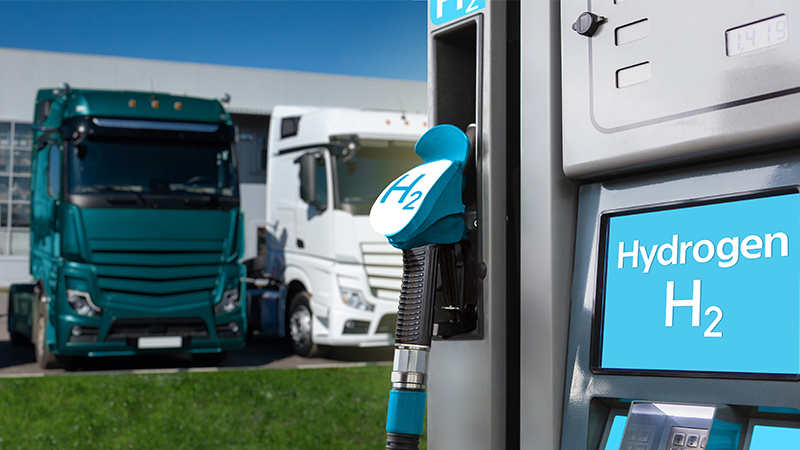The UK Aggregated Hydrogen Freight project is part of the ZERFT (zero emissions road freight trials) programme, comprising 20 projects focussed on helping the UK solve challenges around zero emission road freight. The project is being delivered by Element Energy, TRL and Toyota.
The objective of this project is to produce a comprehensive report for Government which assesses the feasibility of a nationwide hydrogen truck roll-out over the next 5-years. The study will focus on 44-tonne trucks, but will also explore opportunities presented by lighter freight vehicles. Part of the study will scope a first trial for a nationwide network of accessible hydrogen refuelling stations, serving a representative fleet of 44-tonne right-hand-drive trucks.
The challenge
The requirement for decarbonised road vehicles has encouraged major OEMs to develop the first hydrogen fuel cell trucks. The majority of these vehicles are currently targeting other markets. Without intervention, 44 tonne vehicles are not likely to arrive in the UK until the late 2020s. This would leave the UK market significantly behind our EU neighbours and increase the pressure on operators to meet climate commitments.
The UK Aggregated Hydrogen Freight project is a vehicle operator-led project to use aggregated demand to enable OEMs to provide UK-ready hydrogen trucks by 2025 and enable a refuelling infrastructure build-up. The group involves an ongoing discussion between truck fleet operators, OEMs and hydrogen providers to scope a roll-out. This has demonstrated that a meaningful roll-out is feasible in the period to 2025, but a number of issues need resolution:
- Numerous truck OEMs have declared their intent to supply vehicles to the UK. This needs to be converted into firm commercial proposals, including UK field support, which are attractive to fleet operators The OEM intent is subject to minimum order thresholds (e.g. Hyundai require at least 30 vehicles) - committed demand from named fleet operators is needed to match these thresholds.
- Hydrogen station providers are ready to supply high capacity stations but require ~20 trucks to be pre-committed before they can build these facilities. Station deployment needs to be linked to specific locations where operators can commit to daily refuelling. A nationwide backbone of stations (to take advantage of long-distance driving available from hydrogen trucks) will require
a) standards and protocols for stations (reliability, public access, safety)
b) coordination of station locations to ensure optimal coverage
- This need to coordinate station refuelling deployment leads to a need to define new commercial models for early station roll-out.
- An early H2 truck roll-out will require direct intervention through a UK Zero Emission Freight Trial and a longer-term commitment to supportive policies. Both need to be assessed, scoped and debated to provide confidence in the UK market.
Project scope
The study will create a credible and industry backed scenario for how (and where) a phased roll-out of hydrogen trucks and high capacity stations can occur, and provide a 2 month public demonstration of hydrogen trucks in the UK.
The three main partners in the project will coordinate with a group of truck vehicle operators prepared to aggregate their demand for hydrogen trucks in order to to attract vehicle OEMs to bring vehicles to the UK. This is expected to lead to sales in their 100's per year in the mid/late 2020s. The partnership is completed by a group of OEMs willing to supply vehicles, and hydrogen suppliers ready to set up hydrogen truck refuelling stations.
TRL's contribution
As part of the overall feasibility assessment work, TRL will be providing the recommendations relating to all safety and safety regulatory issues relating to the deployment of hydrogen HGVs and their refuelling stations.
TRL will also be conducting a GIS-based traffic analysis to identify ideal locations for hydrogen refuelling stations in a future national network.
Drawing on our extensive vehicle trial experience, TRL will scope, coordinate, monitor and evaluate a mini truck trial towards the end of the project. The intention is to invite 2 OEMs to provide leased trial vehicles, which will be offered to fleet operators for hands-on driving and hydrogen fuelling provided by existing infrastructure. These 2-month trials will enable operators to touch and feel vehicles before making a purchase commitment (helping de-risk the deployment), and provide valuable operator and safety feedback into the overall design of the recommended plans for early full-scale deployment.
The project is expected to take around 9 months and report in the spring of 2022.
Acknowledgements
This project receives funding from the Department for Transport through Innovate UK, with 30% of the project cost being met by investment from TRL’s industry partners in the consortium delivering the project.

